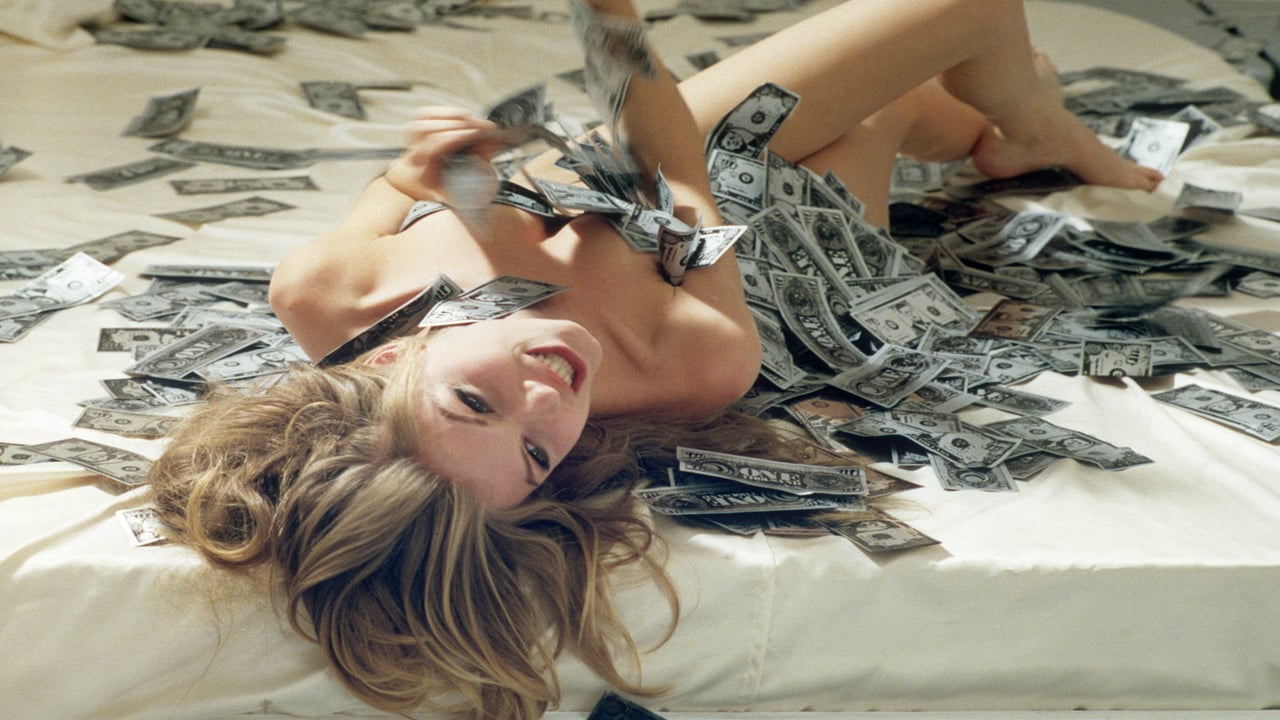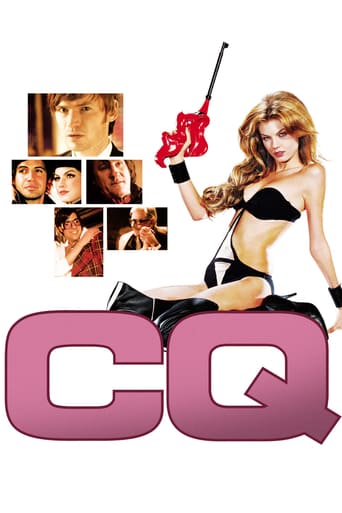

Part David Halsmanns Diary, part Alphaville and part Contempt, Roman Coppola's debut feature is a light, caring homage to the cinema of the 1960's.Everything from the sets, costumes, music, even the detail gone into the film within a film "Dragonfly" captured the era perfectly. Performances by the entire cast were spot on. Giancarlo Giannini as the old school producer who can never decide how many films he has made to Gérard Depardieu's as the director whose films have to have soul and not sell out.Biggest credit must go to Roman for choosing Jeremy Davies to play the lead, as I was constantly intrigued how a creative character like his would finish his journey in this film. Giancarlo Giannini's as the producer even mentioned "The most important part of a film is the ending, this is the last thing the audience will remember when they leave the cinema!"An important statement as Jeremy Davies goes on to finish his major film as Gérard Depardieu intended and he also got to finish his personnel film, where he discovered a lot about himself through the truth of cinema. The most enjoyable film from all the brood of Francis Ford Coppola.
... View More(Note: Over 500 of my movie reviews are now available in my book "Cut to the Chaise Lounge or I Can't Believe I Swallowed the Remote!" Get it at Amazon.)There are two films within a film in this campy debut from Roman Coppola. There is the introspective black and white, experimental, "student" sort of film that the young director Paul (Jeremy Davies) is making in his Paris apartment, and there is "Dragonfly," a kind of Barbarella (1968) sci-fi space shoot 'em up that he ends up directing. These might be seen as the twin realities of the young film maker: on the one hand there are those short films you made at USC or UCLA film school to get your degree; on the other, there are those mindless commercial entertainments that Hollywood needs to crank out for the masses. These represent the bookends of the young director's reality.The third film, the film that exists over and above these two, is the film that Roman/Paul would like to make, a film about what it is like to be a young film maker amid the crass commercialism of the producers, the seductive lure of the glamor that is the film maker's world, and the daily often tedious work of the actual film making. In other words, Roman Coppola is self-exploring in public. He is the novelist as a film maker."Dragonfly" itself is indeed Barbarella without the benefit of Terry Southern's contributions to the script or the services of Jane Fonda. It is unconsciously campy and a satire on such films. Model Angela Lindvall, five feet ten and three-quarters inches tall, anorexically thin, and sporting some very serious hair, plays Dragonfly with a kind of Barbie doll intensity. It is immediately obvious that she has the muscle tone of the languid and the athletic ability of a preteen. Yet her character is a "for hire" secret agent skilled in the martial arts and the use of weapons. Playing opposite her is Billy Zane as "Mr. E" a kind of Che Guevara revolutionary who is absurdly stationed on the far side of the moon where he is training revolutionaries.In the introspective black and white film, Paul sits on the commode and talks to the camera much to the disdain of his live-in girlfriend Marlene (French actress Elodie Bouchez, best known for her work in the outstanding The Dreamlife of Angels (1998)) who would like him to pay more attention to her.This might be compared (distantly) with Francois Truffaut's La Nuit Américaine (Day for Night) from 1973 in which the great French director plays himself making a film--in other words a film within a film. Jeremy Davies reminds me somewhat of the sensitive, boyish actor Jean-Pierre Leaud, who played in that film after gaining prominence in Truffaut's Les Quatre cents coup (1959). It is easy to see Truffaut's influence on Roman Coppola, as indeed Truffaut has influenced many directors.I don't think CQ ("Seek You") was entirely successful mainly because I don't think Roman made the transition from the self-indulgence and showiness characteristic of the very films he is satirizing to the mature project that addresses itself more directly to the needs of the audience. There is some fancy camera work with mirrors and characters seen from interesting angles, and some beautifully constructed sets, and some witty dialogue amid some telling satire of filmland people and their world (especially producer Enzo played by Giancarlo Giannini and Dragonfly's idiot second director), but we are never made to care about what happens to any of the characters, this despite the fact that Davies is a very sympathetic actor.Some of the jokes in the film include the three-day five o'clock shadows on the faces of the young actors. (That style is almost contemporary--not sixties-ish.) The hairstyles of the women with the beehives and such hinted of 1969, the year of the main film, but the eye makeup again was more contemporary than sixties-ish since it lacked the very heavy black eyelashes and eye liner that one recalls. To get it right, Roman should have reviewed, e.g., Blow-Up (1966) or Elvira Madigan (1967), films I am sure he has seen. Another is the view of Paris in the year 2001 as seen from 1970. It is futuristic in a silly way, and recalls some science fiction that exaggerated the technological changes that would take place. Orwell's 1984 (from 1948) has not yet arrived, nor has the overpopulated, polluted world from Blade Runner (1982).Appearing in small roles are Dean Stockwell as Paul's father, and veteran French film star Gerard Depardieu as Dragonfly's original director.Bottom line: worth seeing if only because it is the first film of the son of Francis Ford Coppola who may yet do something to rival the great works of his father. By the way, this might also be compared to The Virgin Suicides (2000), his sister Sofia Coppola's first film, just to see who is more likely to best please Dad. I'm taking no bets.
... View MoreI found this movie interesting for its depiction of movie making techniques in the sixties. The Eclair cameras, the editing console, the splicer, the wooden tripods -- these are the things to which I paid attention. Elodie Bouchez is a serious young actress who is always nice to watch but in this movie her weepy, bitchy character wasn't very sympathetic. The editor's concern for film as art was, but his soft-spoken, passive personality became increasingly annoying. Is this the sort of guy the blue-eyed babe (ala Barbarella) would be interested in? It's hard to believe. Gerard Depardieu had a brief appearance as the "revolutionary director" who is thrown off the project by the exasperated producer. Probably the best scene in the movie, the way he punched through the door of the screening room and shouted, "Bullshit!" was it's funniest moment. I also liked the girl in the miniskirt climbing into the car on New Years Eve who wasn't wearing any panties. Too bad there weren't a few more scenes like that.
... View MoreWatching the trailer for this movie, I couldn't help but feel excited.Look at all the swank 60's spy movie references!Well ... this wasn't the movie I'd hoped for. I believe that "CQ" is Roman Coppola's (son of famous Francis Ford Coppola) first feature-length movie. And I suppose that all first-time directors flail and hick-up in their first (hell, even second and third) films.But Coppola very blatantly tries to conceal all his director and writer disabilities by shrouding the film with 60's pop-culture trivia ... something that I'm sure his "hipster" handbook directed him to do.The premise involves an American attempting to edit a ridiculously avant-gard sci-fi/spy Modesty Blaise-esque movie in Paris ... while in his personal time he whines and moans about how he isn't adept enough to sustain a meaningful relationship ... all this through the eyes of a camera. And whilst he records his day-to-day life on film ... he neglects his stunning french girlfriend.So ... our young American in Paris ends up taking the reigns of the spy movie and plenty of hijinx ensue.It isn't hard to predict how the movie will end. And if you wait around long enough and can somehow see past Coppola's bloated, pretentious and pedestrian writing and direction ... then you'll have earned a shining ticket to complain about how great this movie COULD have been.And people wonder why nobody remembers (or wants to remember) this movie. Chalk it all up to the futile attempts of a son of a great director to become more than his father.Remember ... even old Francis Ford had to LEARN filmmaking. Anyone ever see "Dementia 13?" It wasn't a HORRIBLE movie ... but then again ... it wasn't "Apocalypse Now," either.Roman's sister, Sophia Coppola has done so interesting work. If anyone inherited Francis Ford's filmmaking genes ... my guess is that it's her. "The Virgin Suicides" is a really excellent movie. "Lost in Translation" wasn't bad either.So ... Roman ... keep on making those music videos. Your video for "The Strokes" was painfully dull ... but it was a little easier for me to switch channels.
... View More